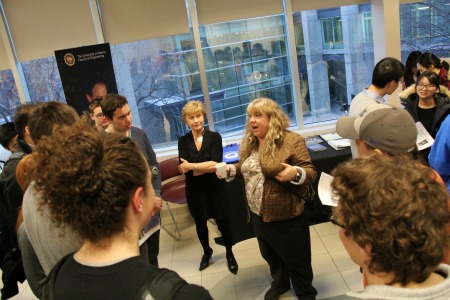
Janet Elliott, a professor in the Department of Chemical and Materials Engineering who holds the Canada Research Chair in Thermodynamics and is an internationally renowned cryobiology and cryopreservation researcher, speaks with undergraduate students about research opportunities. More than 200 engineering students attended the kick-off of a week-long Faculty of Engineering event showcasing research and graduate studies opportunities.
(Edmonton) A week-long graduate studies and research showcase kicked off with about 200 engineering students attending a career-fair style event and meeting with professors and graduate students and learning about research and graduate studies opportunities.
Associate Dean (Programs and Planning) Jason Carey kicked off the inaugural Graduate Studies and Research Week event, telling students that it could be to their advantage to explore research and graduate studies.
He encouraged students to explore leading-edge research in the faculty, as an investment in their own futures. A graduate education gives engineering students skills and knowledge that "make you more employable" and invaluable to employers.
Many of the research projects in the faculty are conducted in partnership with industry, he added, and have real relevance. What's more, graduate students working on these projects establish relationships with potential employers during their studies.
Graduate school costs money, he acknowledged, but grad students earn money while learning, and financial support is abundant: last year the Faculty of Engineering provided more than $20 million in support to graduate students.
Manaswy Gollamundi, a fourth-year civil engineering student, said she attended the event because there are fewer engineering jobs available at the moment. As an international student paying full tuition, finding a job after graduation was her priority. She's thinking differently now.
Gollamundi caught the research bug when she took on a Dean's Research Awards project and now says she'd enter a graduate studies program-if she finds a research program she's interested in.
For Mark Lawley, who's in his final year of a chemical engineering program, a job in industry was "always a good back-up plan" Because he has been planning all along on entering a graduate studies program.
Graduate students volunteering at the event said they took time to speak with undergraduates to give them the facts about advanced studies.
Aida Valevicius, a PhD student in the Department of Biomedical Engineering, said undergraduates were asking about summer jobs or co-op placements, and asking what it's like to be in a graduate studies program.
"I think this event is a great idea because it's an informal setting and there are so many undergraduates here," said Valevicius, who is conducting biomechanics research to help evaluate new high-tech prosthetics.
Valevicius added that she hoped she could inspire young engineers-particularly women-to pursue an advanced degree.
For mechanical engineering professor Aloke Kumar, who holds the Canada Research Chair in Microfluidics for Biological Systems, the event was all about inspiring undergraduates.
"This is a great event," he said. "We want Canadian undergraduates to get into the research cycle-even if they go to school somewhere else, we want to open their eyes to the world of research."